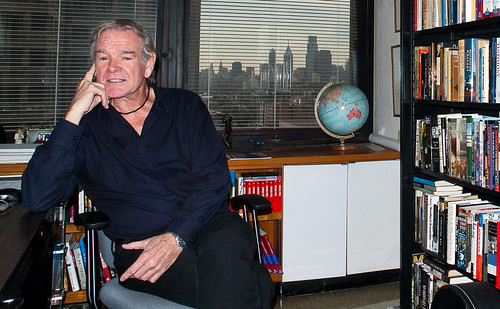
Introducing Ralph Young
Professor Ralph Young has been a lot of things in his life, including a teacher, author, protester and historian. Nowadays, due to his relentless study of the history of dissent in America, of which he teaches a class of the same name, media outlets have been calling him to get a historical perspective on the Occupy movement. Young, who also takes interest in protest music, has hosted teach-ins every Friday since 2002.
The Temple News sat down with Young to discuss his contributions in the classroom and in the historical society.
The Temple News: What was the inspiration to start your “Dissent In America” teach-ins? Have there been good turn outs for them during the years?
Ralph Young: They grew out of my first Dissent in America class in September 2002, when students consistently stayed after class to discuss the present-day ramifications of the historical protests we were studying. The students decided once the course was over that we should continue the discussions on a weekly basis. The turnout over the years has been consistently good. Sometimes, depending on the topic, turnout has only been 15-20 people. But many teach-ins have had as many as 100 people in attendance. One, once, led by [Judge John Jones] who presided over the Dover, Pa. “intelligent design vs evolution” trial was attended by close to 300 people. We had to move to the large lecture hall in Anderson to accommodate everyone. That was the largest turnout we’ve ever had. I’d say the average turnout over the years has been about 40 people, which I think is pretty remarkable considering that the teach-ins are held on Fridays during the late afternoon hours. The biggest news story of the past year that got the biggest turnout was the Feb. 11 teach-in on Egypt that just happened to take place the same day that [former Egyptian President Hosni] Mubarak resigned.
TTN: Do you have a favorite protest singer or singers?
RY: I’ve always been interested in protest music and I have many favorites, such as Bob Dylan, Phil Ochs, Pete Seeger and many others. I have studied the history of protest music and often spend some time teaching it in classes.
TTN: Why do you think you have been repeatedly called upon to speak about the Occupy movement?
RY: Because it’s my field of historical research, and teaching, and because of my book [“Dissent in America: Voices That Shaped a Nation”] and my [Dissent in America] course. And maybe even because the teach-ins have received some media attention. What the press is mostly interested in when they contact me is for me to give them some historical background, to place the protests in historical context. And of course the Occupy Movement is part of a long historical tradition of dissent in the United States.
TTN: Do you think the media is portraying the movement accurately and fairly?
RY: It’s mixed. At first it was not terribly accurate and just like most media coverage of protest movements over the years–for example, women’s suffrage, union organization attempts, the civil rights movement, the anti-Vietnam War protests–it was pretty negative. It mostly came out snide, snarky and belittling. But I think some news coverage, especially the more reputable media outlets, has recently become more accurate and balanced.
TTN: What were your thoughts on the mass walkout on Main Campus last week?
RY: I thought it reflected how tuned-in Temple students are to the controversial political, economic and social issues of today.
TTN: In comparison with other mass movements through time, where do you see Occupy Wall Street stacking up?
RY: It’s still in its infancy. It could grow immeasurably or it could peter out. It reminds me of other economic protests, such as Coxey’s Army in 1894 that marched on Washington and the 1932 Bonus March. It also has a grassroots quality to it like the early civil rights movement.
TTN: Do you see the students that you teach in “Dissent In America” as really interested and invested in what you teach?
RY: Yes I do. I think Temple students, or at least the ones I’ve met, are very dedicated to their education and the issues of our times and the American tradition of protest, especially in the last several years. Besides, 19, 20 and 21-year-olds are natural dissenters anyway and they’re very concerned with their place in the world they’re inheriting.
Kevin Stairiker can be reached at kevin.stairiker@temple.edu.



Ralph is a fantastic professor, I highly recommend him!